#explosion outside kabul
Text
Explosion Kuba Matanzas
Explosion Kuba Matanzas Matanzas (+video) › Cuba ” in Granma ist wegen eines stromlecks in einer Tankstelle ein Feuer ausgebrochen.
Explosion Kuba Matanzas Am Freitag brach in einem Tank am Stadtrand von Madanzas ein Feuer aus.
Explosion Kuba Matanzas
Als der Blitz die Kuppel der Anlage traf, die als geodätisches Kuppeldach bekannt ist, enthielt die Lagerstätte etwa 50 Kubikmeter inländisches…
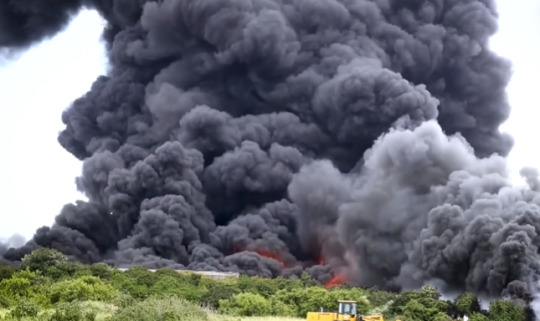
View On WordPress
#explosion at kabul airport#explosion in kuba film#explosion kuba havanna#explosion kuba heute#explosion kuba luxushotel#explosion kubanisches hotel#explosion outside kabul#explosion outside kabul airport#kabul explosions
0 notes
Text
The mass shooting and fire at the Crocus City Hall concert venue outside Moscow on March 22 was the deadliest terrorist attack Russia has seen since the 2004 Beslan school siege. The gunmen’s actions claimed at least 137 lives and injured 180 others. The four suspects currently in custody are citizens of Tajikistan. But Russian authorities are doing their best to connect the attack to Ukraine. Sources in Western intelligence, meanwhile, say it was the work of the Islamic State-Khorasan, a branch of the Islamic State also known as ISIS-K. Experts note that ISIS-K has declared Russia among its main enemies (along with the U.S. and China). Meduza breaks down what you need to know about ISIS-K and why the group has Russia in its sights.
What is ISIS-K?
ISIS-K, or the Islamic State-Khorasan, is a branch of the Islamic State that operates primarily in Afghanistan and Pakistan. Formally, the organization governs an ISIS province (wilayah, in Arabic) and reports to the ISIS caliph. Currently, this position is held by Abu Hafs al-Hashimi al-Qurashi, whose four predecessors were killed in U.S. operations.
According to ISIS ideology, its caliphate, or state, aims to span the entire globe. The organization has divided the world into provinces, some of which are headed by local Islamist movements that operated before ISIS came into existence (for instance, ones connected to Al-Qaeda). In fact, ISIS itself emerged when the Al-Qaeda branch in Iraq severed ties with the global Al-Qaeda leadership.
Similarly, the Afghan-Pakistani branch of the Islamic State, ISIS-K, emerged in 2015 as a local movement. Initially, the group was composed of several thousand opponents of Afghanistan’s pro-American government, mostly Pashtuns, who were disillusioned with the Taliban. ISIS-K immediately started engaging in armed conflicts with the U.S. army, the Afghan government, and, even more brutally, with the Taliban.
The Taliban’s ideology fundamentally differs from that of ISIS. The Taliban aim to establish a national Islamic State in Afghanistan, while ISIS supporters advocate for world domination and the defeat of all “infidels.” Islamic nationalism won out in Afghanistan (and neighboring Pakistan), and by 2018, the Taliban (with the unofficial help of U.S. air support) had virtually destroyed ISIS-K’s organized resistance in the eastern provinces. U.S. forces killed several of the group’s leaders and, according to experts, the organization’s numbers were severely depleted, going from several thousand to a few hundred people.
Sanaullah Ghafari, who took over ISIS-K’s leadership, shifted the group’s strategy from direct armed confrontations to increasingly ruthless acts of terrorism against the Taliban, religious minorities, and Americans. During the U.S. troop withdrawal from Kabul in August 2021, he allegedly orchestrated a suicide bombing at the airport gate through which refugees fleeing Taliban rule were trying to enter. The attack killed 182 people, including 13 U.S. servicemen.
ISIS-K later expanded its list of enemies to include Russia, among others. On September 5, 2022, an explosion near the Russian embassy in Kabul killed five people, including two embassy staff. ISIS-K claimed responsibility for the attack. In January 2024, more than 90 people were killed in twin explosions in Kerman in Iran. U.S. intelligence confirmed ISIS-K orchestrated the attacks. However, Taliban agents allegedly killed Ghafari in 2023, and it’s unclear who’s currently at the helm of ISIS-K. That said, judging by the Iran attacks, its strategy remains unchanged.
Why Russia?
Radical Islamists have long accused Russia of being a state that “oppresses Muslims” both at home and abroad. ISIS propaganda regularly mentions Russia’s past military campaigns in Afghanistan and Chechnya, and Moscow’s intervention in support of Bashar al-Assad’s government in Syria put an even bigger target on its back.
ISIS-K leadership has seen the initial success of ISIS leadership, which capitalized politically on the global struggle against “infidel empires” such as the United States, China, Iran, and Russia. Prioritizing “external operations” could yield far greater political and financial benefits (in the form of donations) than working with local resources.
There are also deeper reasons for the particular hostility towards Russia. In recent years, ISIS-K has been trying to expand the movement’s ethnic base — both in Afghanistan and beyond. In the northern regions of Afghanistan, where many ethnic Uzbeks and Tajiks live, its numbers are growing. ISIS-K regularly threatens Central Asian authorities, calling them “puppets of the Russian empire.” In this sense, the struggle against Russia is a fight for resources: primarily for radically minded supporters in Uzbekistan, Tajikistan, and neighboring countries.
Was ISIS-K behind the attack?
There’s still no publicly available indisputable evidence that ISIS-K organized the attack. However, ISIS has claimed responsibility, and sources told CNN that the U.S. is in possession of intelligence confirming these claims. The New York Times also reported that Washington considers ISIS-K to be behind the attack.
Ruslan Suleymanov, a Middle East expert, expressed skepticism to Meduza about whether ISIS-K currently possesses the necessary resources to organize such a large-scale terrorist attack on the outskirts of Moscow. However, the attack doesn’t appear to have been “high-tech” in nature: the perpetrators clearly had problems with their escape plan, as well as with weapons. (In a video from the attack, sparks are seen flying from the barrel of one of the machine guns, which could indicate that either the ammunition or the weapons themselves were in poor condition.)
Suleymanov said it’s also difficult to confirm whether messages on ISIS Telegram channels are authentic as the group’s accounts are regularly blocked, forcing it to create new ones. The posts about the Moscow attack come from ISIS-linked Amaq News Agency, not from ISIS-K directly. In one picture, the four alleged “participants in the operation” are shown with blurred faces against the backdrop of the Islamic State flag. Amaq later released a first-person body-cam video that clearly shows the attack on Crocus City Hall, corroborating the Islamic State’s involvement.
7 notes
·
View notes
Text
[I]n the period of eerie suspension before the explosion [...], those who registered the [...] uncanny [...] experience[d] a condition that [...] would become familiar to everyone living in a targeted city during the Cold War: the sense that the present survival and flourishing of the city were simultaneously underwritten and radically threatened by its identity as a nuclear target. [...] [I]nhabitants of Cold War cities [...] became accustomed to a more overt and permanent variant of the uncanny frisson [...]. Lobbing incendiaries and explosives through the roofs and windows […], the British gunners gutted portions of the Dublin city center; during the week of the Rising, 500 people died […]. The more frequent and extreme outbreaks of traumatic violence in everyday urban life […], in the early-twentieth-century imaginary, the city had begun to host new forms of sudden mass death and severe physical destruction.
Cities had, of course, been sites of mass death before 1916.
But the Easter Rising differed from nineteenth-century urban barricade fighting in the use, principally by British soldiers, of more precise and destructive weapons; fired from the ground, from rooftops, and from gunships in the Liffey, the new cannons, incendiaries, and machine guns rapidly reduced whole blocks of the city center to ruins. These emerging military technologies and strategies link the Rising to the Great War then raging in England and on the Continent, whose fields and cities had become proving grounds for new weaponry and modes of warfare. In Ireland and the Great War, [...] “Like the Western Front [the Easter Rising] became a war of attrition, and the lessons of the Western Front were taught again in the streets of Dublin.” […]
---
Though the shelling of Dublin in 1916 reminded observers of Ypres, Louvain, and other European cities ruined in the Great War, it might as credibly have called to mind a different list: Canton, Kagoshima, and Alexandria. During the second half of the nineteenth century, British naval bombardments made rubble of these coastal cities […].
The naval bombardment of undefended cities and civilians, particularly those in colonial territories, paved the way for the first airplane bombardments, in which the imperial powers of Europe dropped bombs on nonwhite, non-European adversaries and anticolonial forces.
Italy pioneered airplane bombardment in 1911 by bombing Arab oases outside Tripoli; British planes bombed Pathans in India in 1915, Egyptian revolutionaries and the Sultan of Farfur in 1916, a Mashud uprising on the Indian-Afghanistan border in 1917, and Somaliland and the Afghan cities of Dacca, Jalalabad, and Kabul in 1919.
---
Several years before the inhabitants of European cities experienced it, aerial bombardment had been established as a uniquely colonial nightmare. [...] [T]he initial use of airplane bombs against colonies was foreseen and even fed by a racist fantasy pervading early-twentieth-century European science fiction, a fantasy of bombing subject races either into submission or out of existence. The willingness of several signatory nations to ignore Article 25 when bombing nonwhite soldiers and civilians made colonial towns and cities the first civilian spaces secured by the implied threat of bombardment from above.
In the world war […] the brief tenure of aerial bombardment as an exclusively colonial technique ended when imperial powers launched the first bombing campaigns against the cities of other imperial powers, initiating a change that would later find its apogee in the nuclear condition: the reconfiguration of the major metropolis as target.
---
Text by: Paul K. Saint-Amour. “Bombing and the Symptom: Traumatic Earliness and the Nuclear Uncanny.” Diacritics Volume 30 Number 4. Winter 2000. [Bold emphasis and some paragraph breaks/contractions added by me.]
21 notes
·
View notes
Text
From The Guardian: “I am crying as I write this, but every moment we spent together is unforgettable.”
“Last week, a suicide bomber killed at least 53 people – mostly girls from the minority Hazara ethnic group – outside an education centre in Kabul. Here, relatives and friends of four young women who died remember their loved ones.”
Omulbanin Asghari, 17: wanted to study at Harvard. “...she began watching a lot of motivational videos online and strengthened her will to succeed by reading books about revolutionaries such as Che Guevara and global leaders like Nelson Mandela. An avid reader with a thirst for knowledge, she read everything from books on economy to psychology” writes her brother. “It breaks my heart that she could have done so much good in this world....I had no words then and no more now.”
Waheda, 18: “What did she mean to me? She was my everything. My friend who spent every hour of the day for the past 18 months sitting by my side, sharing every moment of happiness, sadness and beyond. Waheda wasn’t just my best friend, she was like a mother to me. She saved me... I was running late on my way to the Kaaj Educational Center. I reached it a few minutes after the explosion...I finally found her lifeless body. Frozen, shocked and shivering, I didn’t leave her side until her father arrived...” writes her best friend.
Bahara, 20: “ She never hurt anybody; was kind, well-mannered and always had a smile on her face...she really was one of the funniest people you could ever meet. Bahara aspired to study computer science. She never wanted to leave Afghanistan. Her goal was to rebuild this nation and help her people. She was killed because she was a Hazara woman. An intelligent woman who was a great combination of playful, yet seriously determined.” writes her brother.
Marzia Mohammadi, 16: “In one of Marzia’s diary entries she made a list of all the things she wanted to do in life; her bucket list. Top of the list was to meet the renowned author Elif Shafak, followed by a visit to the Eiffel Tower and Paris and eating pizza in an Italian restaurant... [her] diary reveals the world of a teenager who wanted to learn and explore the world. ‘I didn’t even know she used to keep such a diary,’ [her uncle] says, the grief evident in his voice. ‘Some of her thoughts were so profound that I couldn’t believe they were expressed by such a young child.’”
Full Story
2 notes
·
View notes
Text
Two Russian embassy staff are among at least six people killed in a suicide bombing in the Afghan capital Kabul, Russian and Taliban officials say.
Guards shot the attacker dead as he approached the entrance to the consular section, officials said.
A number of other people are reported to have been wounded. No group has said it carried out the bombing.
The attack is the first on a foreign mission in Afghanistan since the Taliban swept to power in August 2021.
Earlier, a Taliban official said at least 10 people had been injured. Russia's state-owned news agency RIA reported that a diplomat and an embassy security guard had been wounded.
Other media reports put casualty figures higher.
It was not immediately clear who would target Russia's interests in Afghanistan, or whether the bombing - the latest in a spate of attacks in Kabul and elsewhere - may have been aimed at undermining Taliban security reassurances.
"This morning, an explosion took place at the Russian embassy in Kabul - four people and two employees of the Russian embassy were killed, and a number of Afghans were injured," a statement from the Taliban police chief's spokesman in Kabul said.
It added the suicide bomber had been spotted by Taliban personnel guarding the embassy as he approached people gathered in front of the building.
"He was identified by security and targeted, which caused a blast," the spokesman said.
Russia's foreign ministry said "an unknown militant set off an explosive device near the entrance to the consular section".
"Without any doubt, we are talking about a terrorist act, which is absolutely unacceptable," Kremlin spokesman Dmitry Peskov told reporters in Moscow.
Speaking from hospital, survivors of the attack spoke of the chaos in its aftermath.
"I went to the Russian embassy to get a visa. We were sitting outside," a man called Faiz Mohammad told Reuters. "The consul came and we showed him our papers, he guided us towards the entrance door of the embassy. Suddenly the blast occurred and I fell on the ground."
Another man called Wahidullah was close by: "I heard a huge blast. Later I didn't understand what happened to me, I just remember the blast threw me out on the street. My hands and legs were not working, then my cousin ran toward me and brought me to this hospital."
Ahmad Samir, a boy who suffered head injuries in the blast, said "there were so many injured people around, everyone was fleeing the site".
Russia is one of the few countries to maintain a diplomatic presence in Afghanistan. Moscow does not officially recognise the Taliban's government - no country does. However the two sides have discussed possible Afghan purchases of commodities like wheat, gas and oil from Moscow.
Violence in Afghanistan has greatly declined since the Taliban returned to power - under its 20-year campaign to drive US-led forces from Afghan soil many attacks were carried out by Taliban militants themselves.
However security has been deteriorating in recent months. A string of deadly bomb blasts has mainly targeted mosques and minority communities, many claimed by the militant Islamic State (IS) group who see the Taliban as not radical enough.
Last week, a suicide bomber struck one of western Afghanistan's biggest mosques, killing at least 18 people, including an influential imam who supported the Taliban.
2 notes
·
View notes
Text
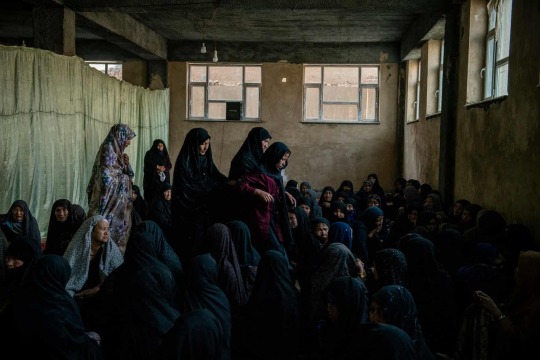
In May 2021, an explosion outside a high school in Kabul, Afghanistan, killed at least 70 people and wounded more than 150, many of them teenage girls leaving class. Visual storyteller Kiana Hayeri took this photograph in the basement of an unfinished mosque where neighbours and relatives of two of the victims have gathered to support their mothers through their grief
Photograph: Kiana Hayeri
1 note
·
View note
Text
Six civilians killed in Afghanistan suicide bomb attack, second blast in 3 months
Monday's blast was the second attack near the foreign ministry in Kabul in less than three months, and the first since the Muslim holy month of Ramadan began on Thursday in Afghanistan.
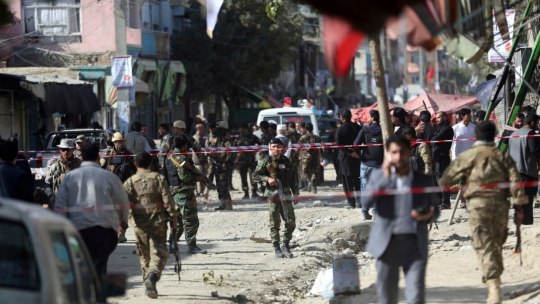
KABUL: A suicide attack on Monday near Afghanistan's foreign ministry killed six civilians and wounded several others, the interior ministry said.
Security has dramatically improved since the Taliban stormed back to power in August 2021, ousting the US-backed government and ending their two-decade insurgency, but the Islamic State group has proved an increasing threat.
The attacker was identified by Afghan forces who shot at him in front of a business centre near the foreign ministry, interior ministry spokesman Abdul Nafy Takor tweeted.
"With his killing, the explosives carried by the attacker also exploded which killed six civilians and wounded a number of others," he said.
Italian NGO Emergency, which operates a hospital in the capital, confirmed it had received two dead and 12 wounded, including a child.
No group has claimed responsibility for the attack.
Monday's blast was the second attack near the foreign ministry in Kabul in less than three months, and the first since the Muslim holy month of Ramadan began on Thursday in Afghanistan.
On January 11, a suicide bomber blew himself up near the foreign ministry, killing 10 and wounding 53 people, according to the United Nations.
The Taliban authorities, who have often tried to play down attacks challenging their rule, had said that five people were killed in that attack, claimed by IS.
The group has increasingly become a major challenge, killing and wounding hundreds of people in several attacks, some targeting foreigners or foreign interests in a bid to undermine the Taliban government.
At least five Chinese nationals were wounded in December when gunmen stormed a hotel popular with businesspeople in Kabul.
That raid was claimed by IS, as was an attack on Pakistan's embassy in Kabul also in December that Islamabad denounced as an "assassination attempt" against its ambassador.
Two Russian embassy staff members were killed in a suicide bombing outside their mission in September in another attack claimed by IS.
The Taliban and IS share an austere Sunni Islamist ideology, but the latter are fighting to establish a global "caliphate" instead of the Taliban's more inward-looking aim of ruling an independent Afghanistan.
0 notes
Text
An explosion has occurred outside the foreign affairs ministry in Afghanistan's capital Kabul, causing casualties, a police official says.
The blast hit about 4pm on Wednesday, Kabul's police spokesman Khalid Zadran told Reuters.
He did not provide details on the number of casualties.
The Taliban-run administration has faced an insurgency by Islamic State militants who have targeted foreigners at certain sites, including the Russian and Pakistani embassies and a hotel catering to Chinese businessmen.
Also read: Japan lodges protest to China over visa suspension
The blast took place at a busy time of day in a heavily fortified area surrounded by checkpoints on a street housing several ministries.
A person in a nearby office who asked not to be named as they were not authorised to speak to media described hearing a loud explosion and said they were later removed from their building.
Some countries, including Turkey and China, also have embassies in the area.
0 notes
Text
Blast kills at least 5 outside Kabul Foreign Ministry
Blast kills at least 5 outside Kabul Foreign Ministry
Comment on this story
Comment
ISLAMABAD, Pakistan — An explosion outside the Ministry of Foreign Affairs in the Afghan capital has killed at least five people with higher casualty numbers feared, according to a Taliban police spokesman.
Khalid Zadran, tweeted that those killed in the blast were civilians and that many others were injured. He did not specify the number of wounded, but previously…

View On WordPress
0 notes
Text
Explosion outside Afghan foreign ministry in Kabul | News
Explosion outside Afghan foreign ministry in Kabul | News
BREAKINGBREAKING,
Police spokesman Khalid Zadran said that the blast in the Afghan capital resulted in casualties.
An explosion has been reported near the foreign ministry in Afghanistan’s capital Kabul, with a senior police official saying the blast caused casualties.
The blast hit around 4pm local time (1130 GMT) on Wednesday, police spokesman Khalid Zadran said, adding that “security teams…

View On WordPress
0 notes
Text
At least 10 killed, 8 injured in blast outside military airport in Kabul
At least 10 killed, 8 injured in blast outside military airport in Kabul
A blast outside a military airport in Afghanistan’s Kabul has reportedly killed at least 10 people. Many others have sustained injuries in the explosion.
New Delhi,UPDATED: Jan 1, 2023 19:55 IST
An investigation into the blast is underway.
By India Today Web Desk: An explosion was reported outside a military airport in Afghanistan’s Kabul on Sunday. At least 10 people were killed in the deadly…

View On WordPress
#airport#blast#injured#Kabul#kabul blast#kabul blast news#kabul explosion#kabul military airport blast#kabul military airport explosion#killed#military#military airport blast
0 notes
Link
0 notes
Text
Several feared dead in blast outside Kabul military airport | News
Several feared dead in blast outside Kabul military airport | News
DEVELOPING STORYDEVELOPING STORY,
Explosion outside the airport causes multiple casualties, a spokesman for the Taliban-run interior ministry says.
An explosion outside the military airport in Kabul has caused multiple casualties, a spokesman for the Taliban-run interior ministry said.
“Today morning an explosion took place outside Kabul military airport, due to which a number of our citizens…

View On WordPress
0 notes
Text
Several feared dead in blast outside Kabul military airport | News
Several feared dead in blast outside Kabul military airport | News
DEVELOPING STORYDEVELOPING STORY,
Explosion outside the airport causes multiple casualties, a spokesman for the Taliban-run interior ministry says.
An explosion outside the military airport in Kabul has caused multiple casualties, a spokesman for the Taliban-run interior ministry said.
“Today morning an explosion took place outside Kabul military airport, due to which a number of our citizens…
View On WordPress
0 notes
Text
Several feared dead in blast outside Kabul military airport | News
Several feared dead in blast outside Kabul military airport | News
DEVELOPING STORYDEVELOPING STORY,
Explosion outside the airport causes multiple casualties, a spokesman for the Taliban-run interior ministry says.
An explosion outside the military airport in Kabul has caused multiple casualties, a spokesman for the Taliban-run interior ministry said.
“Today morning an explosion took place outside Kabul military airport, due to which a number of our citizens…
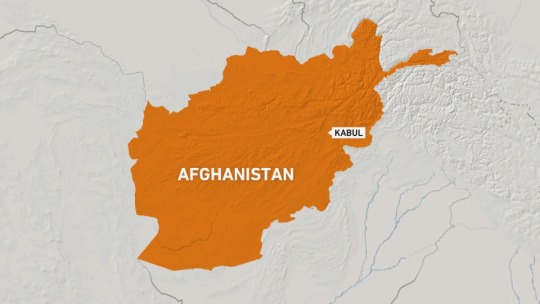
View On WordPress
0 notes
Text
Several feared dead in blast outside Kabul military airport | News
Several feared dead in blast outside Kabul military airport | News
DEVELOPING STORYDEVELOPING STORY,
Explosion outside the airport causes multiple casualties, a spokesman for the Taliban-run interior ministry says.
An explosion outside the military airport in Kabul has caused multiple casualties, a spokesman for the Taliban-run interior ministry said.
“Today morning an explosion took place outside Kabul military airport, due to which a number of our citizens…
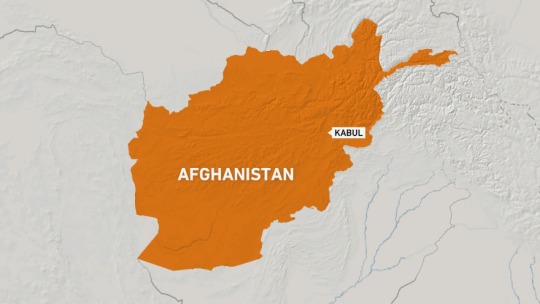
View On WordPress
0 notes